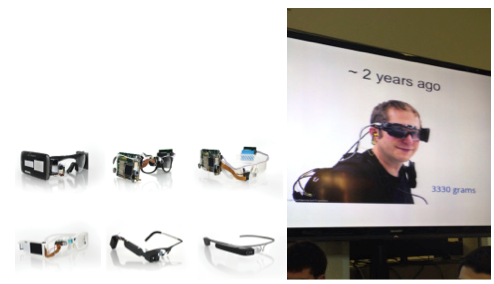Rafael Grossmann, MD, FACS, the first surgeon to use GoogleGlass during live surgery, addresses the recent press about its demise—and his belief in the future it represents.
Is GoogleGlass immortal?
Well, I do think so! In a way.
Would you say that the Ford Model T is dead?
Or did it actually represent the beginning of a revolution, the evolution of transportation?
You see, lately, there has been a lot of press regarding the demise of GoogleGlass. A few articles have explained that the time of Glass has passed, that developers are not interested anymore—that units are for sale on eBay.
Some have called it “the Segway of this era!” I have read most of those editorials and releases. I have to say that I don’t agree with the basic premise of GoogleGlass being a failure.
As any new step, the first one is always shy and careful…Glass represents the next generation, the beginning of the future for the wearable device. Again, the beginning of a revolution, the evolution of the computing and communication platform. It was not invented in a day!

As a “pioneer” device, a “pseudo-beta” product (a ready-product, not ready for the general public but instead for a very select group of skilled individuals in specific disciplines), Glass has awakened the imagination and creativity of the technologic community, the industry and the geeks out there.
I think that we all like the idea of having a “wearable” device on our foreheads, as part of us, almost integrated with our selves, able to allow us to stay connected in the ways that we need or like, to perform our specific tasks more efficiently.
Glass has done that. It has shown that it is possible, and that the road to an ideal and trouble-free device is still being travelled.
Yes, we all agree that GoogleGlass is not perfect, in fact, it is far from it.
But we all remember the amazement of the first time when we saw the screen projected in front of our eye, and the awesomeness of navigating a menu with our voice, or listening to it without a headphone.
We all concur that the battery is poor, the connectivity slow, the voice recognition fair to good, the heating issues feel wrong and that for the day-to-day routine, it’s definitively not ready…but that’s not the point.
Glass represents the leap to something better, to a way of not texting with our fat fingers, bending our neck down to a screen or bringing a hand up to our ears. A way to look up and tap into vast human knowledge, available in the Internet, just by talking aloud.
Glass will allow us to stand up again (like humans do), to speak our commands, to look directly in the eyes of our patients—not turning our backs to them looking at the other screen, or typing orders in.
If anything, it will allow us to connect in a more direct, personal and human way, in those times when we have to use technology.
In a recent article, Noor Siddiqui, COO and co-founder of Remedy quoted:
“Google Glass broke through that mental block, and got doctors to rethink the big clunky computers in our offices… that maybe it would make for a better bedside relationship if we turned away from those computers and got close to our patients again,” Siddiqui said. “…And what’s great is, now that doctors are thinking that way, it’s not about Google Glass anymore.”
I trust that Google is working on the next generation of Glass, and I know that it will be better, and that the feedback and outcries of those with and without faith will be addressed in that next device. We will be surprised.
Let’s wait and see what the future is going to be like.
This article is reprinted with permission. Rafael Grossmann, MD, FACS is a healthcare futurist, GoogleGlass Explorer and surgeon. For more expert insights from Dr. Grossmann, follow him on Twitter @ZGJR and through his blog: Rgrosssz.com
The nuviun blog is intended to contribute to discussion and stimulate debate on important issues in global digital health. The views are solely those of the author.

